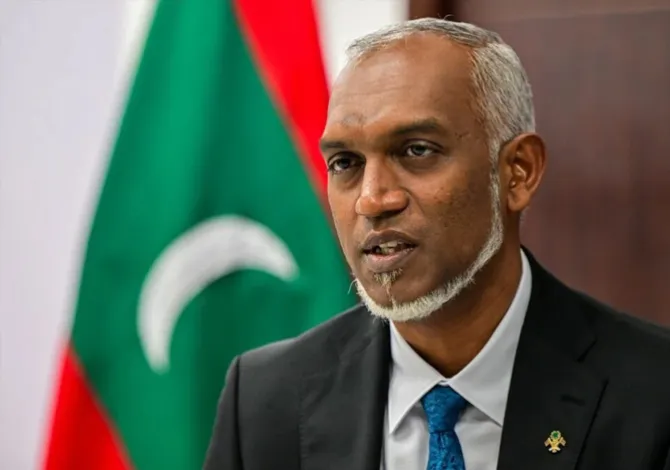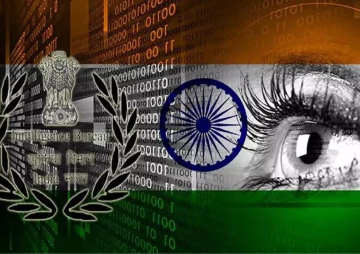
Indian citizens refusing to visit Maldives—an island nation whose recently-elected President Dr Mohamed Muizzu won on the “India Out” plank, and three of whose ministers made racist remarks about India, following Prime Minister Narendra Modi’s tweet thread on his visit to Lakshadweep Islands—is an expression of a rising nation discovering economic nationalism. In the short term, Maldives will suffer the exit of Indian tourists. In the medium term, Chinese tourists will replace them. In just a few weeks, not even months, this controversy will be behind us.
Although the Maldivian economy will not collapse, as it did due to the “Made in China” COVID-19 crisis—in 2020, Maldives’ GDP crashed by 35 percent to US$3.71 billion, approximately the Gross State Domestic Product (GSDP) of Mizoram and returned to US$6.17 billion (GSDP of Puducherry) by 2022—it will get badly bruised. Given that a quarter of its GDP comes from tourism, and India stands at the pole position that provides these tourists, a large chunk of them will vanish the next two seasons. In 2023, more than 200,000 Indians visited Maldives. But that’s it.
Maldives has become a storm in the high seas that will reach a new equilibrium.
The exit of Indian tourists from Maldives will be just one nail—certainly not the last but a nail still—in the coffin of a country that has recently been spitting on the generosity of the Indian hand that stands by it in every crisis—from providing potable water in 2014 and delivering crucial vaccines in 2020 to doling out US$1.2 billion for the country’s infrastructure projects and or preventing a coup in 1988. Maldives has become a storm in the high seas that will reach a new equilibrium. Stray exceptions aside, Indian tourists will now explore the 7,500 km-long Indian coastline comprising nine states and four Union Territories for their beach vacations.
In less than a month, this Maldives issue would become irrelevant to an India busy with a Budget in February, a crucial general election in March, and its result in May. In between and beyond, the country will be focused on increasing economic growth, expanding jobs, creating wealth by investing in its rising stock markets, reforming the economy and reclaiming cultural inheritances. Maldives will be out of the news cycle faster than the last flight to Malé. Domestic Indian politics will trump immature Maldivian tweets.
Embracing violent ideologies has a price that harms self-interest and reeks of a political naivete that, in its new-found hubris, Malé is unable to comprehend, let alone negotiate.
But what the 500,000-people nation will need to know, understand and then deal with are the two dangerous pincers crushing the country—religious fanaticism and strategic blunder. For a small island economy, playing geopolitics at the cost of geoeconomics is fraught with risk. Embracing violent ideologies has a price that harms self-interest and reeks of a political naivete that, in its new-found hubris, Malé is unable to comprehend, let alone negotiate. It’s easy to spit on India and use it as a symbol of geopolitical muscle flexing, but in the middle of the Arabian Sea, President Muizzu is playing with fire. India needs to do nothing—Maldives’ politics will implode under its own hatred.
Religious fanaticism
The first pincer on which Maldives sits is its moral and religious accession to Islamist terrorism. On a per capita basis, Maldives has the highest contribution to the Islamic State. Between 2014 and 2018, Maldives provided 250 women and men to the Islamic State in Syria and Iraq—that’s one out of every 2,000 citizens. In a use-and-throw practice by the Islamic State, most of them died, and about 50 are in camps there. And yet, several Maldivians are still attracted to the lure of becoming and serving terrorists. This presents a danger to India, which the current government will do everything to prevent or manage. Now that the people-to-people preventives have been thrown out by Muizzu in his “India Out” campaign, he should be ready for India managing and deterring terrorist exports from Maldives as part of its zero-tolerance policy.
Muizzu also needs to understand that tourism and terrorism are not good partners. Sooner rather than later, citizens from countries such as the United Kingdom (UK), Germany, Italy, the United States (US) and France—which contribute 530,000 tourists to Maldives, more than the top three (India, Russia, and China) together—will take a U-turn and seek vacation safety in Mauritius, Seychelles, Sri Lanka, and Lakshadweep in the neighbourhood. And if Chinese tourists think they will have it easy, they need to remember that if terror has no religion, its victims get no preference. When a bomb blows up, its shards don’t engage in intellectual debates around nationalities or races.
Muizzu’s government attempted to justify the racist remarks by saying Maldives has freedom of expression.
The bomb doesn’t even pardon its own. In May 2021, an explosion injured Mohamed Nasheed, former President of Maldives. Earlier, in 2007, following the first terrorist attack in the country at Sultan Park, the stop-off for all tourist groups, Maumoon Abdul Gayoom, the President of Maldives between 1978 to 2008, blamed Pakistan. “Maldivians are influenced by what is happening in the world. They go to Pakistan, study in madrasas and come back with extreme religious ideas,” he said. If, therefore, the imploding terrorist state of Pakistan is the role model and aspiration for Maldives, its economy is doomed—no tourist will go to a country where fault lines of terror intersect with marine lines of vacations.
These fault lines are invading the innards of Maldives. From explosions to vandalising Buddhist remains to disrupting Yoga Day celebrations, terrorists are burning the tourist destination from within. Muizzu’s government attempted to justify the racist remarks by saying Maldives has freedom of expression. However, according to Maldives Customs Service, you cannot carry a Bhagwad Gita, a Bible, or any “religious materials offensive to Islam” into the country. Perhaps, the Muizzu government means free speech only for extremists.
If this religious extremism is part of state policy, good luck to Maldives; if not, President Muizzu’s job on this front is clear—dismantle the terror supply chains and destroy the terrorist ecosystem. Otherwise, a future mirroring Pakistan is staring it in the face.
Embracing a strategic blunder called China
The second pincer that will crush Maldives is Muizzu’s government playing into China’s hands. His successful electoral campaign pivoted around “India Out”. As an extension of that campaign, he begins his foreign affairs with a five-day visit to China. He terms China as a “valued ally and integral collaborator”. If this is due to his lack of understanding of China, he only needs to study the case of Sri Lanka, which is reeling under the weaponisation of finance by China, where Beijing is blocking debt relief for the island nation.
Under Xi Jinping, China has become a rogue nation, whose closest friends are client states, North Korea to the East and Pakistan to the West. Whether Maldives wants to join this arc of roguery that has a downward spiral, as the case of Pakistan shows, is its own decision. But that decision has consequences. One of which is the alienating New Delhi. This is something Beijing knows and is possibly crafting.
Under Xi Jinping, China has become a rogue nation, whose closest friends are client states, North Korea to the East and Pakistan to the West.
For the Chinese Communist Party that is now hostage to Xi, the “Chairman of Everything” in China, getting a foothold in Maldives is a step towards a bigger game of encircling India. Muizzu will go down as the President who enabled this and reduced his country into becoming a serf of China, a nation vulnerable to the whims of Xi, a people whose lives will be controlled by Beijing, and a strategic tool to be used and thrown by the People’s Liberation Army.
The Beijing embrace by Muizzu involves his country going bankrupt. Of course, bankruptcy remains invisible till those holding the debt decide to move in. Money looks good until the opaque conditions attached to it reach a flash point. From Pakistan and Kenya to Zambia and Mongolia, countries are reeling under Chinese debt. Sri Lanka is a case in point: Not only has the country seen 500,000 jobs vanish, it lived through an inflation rate that crossed 60 percent in 2023. Holding 10 percent of Sri Lanka’s debt, Beijing refused to enable an International Monetary Fund (IMF) restructuring. Were it not for financial assurances and debt restructuring by India, Sri Lanka would have been bleeding dry.
Unless Maldives reforms, the exotic island may see the end of tourists from across the world. But that’s only the tip of Malé’s sinking strategic fortunes. The country needs to focus on and rethink its Islamist-Chinese pincers. The international strategic community has known this for a long time. Now, most Indians are understanding it too. Finally, ‘intellectuals’ demanding that the Modi government stop Indian companies from isolating Maldives are living on an island of strategic delusion and in blissful ignorance of freedom to do business—one company refuses to do business, another doesn’t, the government does not and must not get in their way.
The Beijing embrace by Muizzu involves his country going bankrupt. Of course, bankruptcy remains invisible till those holding the debt decide to move in.
As far as New Delhi goes, it needs to watch these developments closely, be a good neighbour and help out when needed, but understand that the country is led by a politician who clearly wants India out. It will take just one crisis, a tsunami for instance, for Muizzu to understand the ‘geo’ of his geopolitics. The distance from Beijing to Malé is 5,800 km, from Djibouti 3,500 km, from Karachi 3,400 km, from Colombo 766 km; it is 600 km from Thiruvananthapuram. Now, embed all other issues to this ‘geo’—costs of healthcare and education; cost of trade; price of goods because of longer distances; and access to a US$4 trillion economy, soon to be the world’s third largest. If Muizzu’s India-Out ‘politics’ beats Maldivian India-In ‘geo’, it is only a matter of one electoral cycle before constituents’ self-interest turns into ‘Muizzu-Out’.
Issues for the next elections in this nation of 200 inhabited islands will be around an imploding economy, violent terrorism, and ‘India In’. Modi continues to stand where India has stood for decades. For now, the ship of friendship is anchored on the Maldivian coast; how Muizzu engages with it will determine the short-term future of India-Maldives relations. Small nations becoming pawns in great power games can be fun until bankruptcy and realpolitik come knocking.
Gautam Chikermane is a Vice President at the Observer Research Foundation
The views expressed above belong to the author(s). ORF research and analyses now available on Telegram! Click here to access our curated content — blogs, longforms and interviews.




 PREV
PREV


